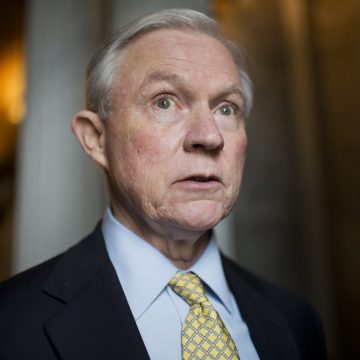
U.S. Attorney General Jeff Sessions recused himself from the online poker legalization debate on June 30. Sessions’ recusal comes as a welcome surprise to the U.S. online gambling community.
During his Senate confirmation hearings for the Attorney General position, Jeff Sessions alarmed gaming enthusiasts by criticizing the 2011 U.S. Department Justice opinion on the 1961 Wire Act and 2006 UIGEA.
At the time, Sessions said he was “shocked” when to hear that the Obama Justice Department did not see online casinos or poker sites as illegal under terms of the UIGEA.
Sessions “Shocked” That Gambling Is Going On
Those comments from the former US Senator from Alabama caused alarm, because Sessions would have the authority to reverse that decision at the stroke of a pen. Jeff Sessions is known hold hardline stances on social issues such as gambling and marijuana legalization. As US Attorney General, Sessions already had called for US federal judges to impose the maximum penalties in cases involving violent crimes.
In recusing himself, Sessions said that he wanted to avoid the perception of favoritism, because of ties he has to anti-online gambling advocate and large-scale GOP political donor, Sheldon Adelson. Adelson’s political action committee recently hired Charles Cooper as a lobbyist on Capitol Hill. Charles Cooper is one of Jeff Sessions’s personal lawyers in the ongoing probe into possible collusion between the Russian government and Trump campaign to influence the 2016 U.S. Presidential Election.
Adelson and Sessions Share the Same Lawyer
Sheldon Adelson founded the “Coalition to Stop Online Gambling” (CSIG), the political action committee which hired Charles Cooper. Since 2014, CSIG waged a campaign to influence politicians at the federal and state levels of government, while funding millions of dollars in attack ads against lawmakers who support online gambling. CSIG has waged a successful holding action against online gambling in US states, helping to restrict online poker to only three states: New Jersey, Nevada, and Delaware.
Mr. Adelson also recruited well-placed Republican lawmakers like former US Representative Jason Chaffetz, US Senator Lindsey Graham, and US Senator Marco Rubio to support a bill which would have banned online poker and casino sites at the federal level.
That bill, Restore America’s Wire Act (RAWA), was introduced in both houses of the U.S. Congress throughout 2014 and 2015, before those efforts foundered in a Decembre 2015 House Oversight Committee hearing chaired by Jason Chaffetz. The hearing went so badly for the anti-online gambling side that Chaffetz had someone else chair the second half of the committee.
Conservatives Dislike the RAWA Bill
Jeff Sessions might see the Charles Cooper connection as a good excuse to sidestep a thorny political issues. While Sessions is personally against online gambling, most Republicans view RAWA as a “states rights” issue. U.S. Senator Rand Paul is an outspoken critic of RAWA, while former US Rep. Ron Paul and anti-tax activist Grover Norquist also oppose RAWA.
Traditional conversatives and libertarians see Restore America’s Wire Act as the type of bill which gives too much power to the federal government. They believe issues like gambling should be under the authority of the 50 state governments. To conservatives, if the government in Washington D.C. has the right to tell states how to oversee online gambling, it could claim the right to oversee dozens of other issues that fall under the broad category of “interstate commerce”.
Jeff Sessions Recuses from Online Poker
The Sessions recusal eliminates the single greatest threat to legal online gambling in the United States, because of the attorney general’s unilateral authority to reverse previous Justice Department policies. While Deputy Attorney General Rod Rosenstein could announce an anti-online gambling policy, Rosenstein is thought to be a firm conservative when it comes to the use of federal authority.
Barring a reversal of the Justice Department’s opinion, the U.S. Congress would have to pass a law to ban online poker. That would require both houses of Congress to pass the same bill and a signature from President Donald Trump. So far, the US Congress has not shown the ability to pass major legislation. Most of federal lawmakers’ energy in the remainder of the year is expected to be devoted to passing healthcare, tax reform, infrastructure, and federal budget legislation.
While one never knows whether RAWA might be attached to an omnibus bill — like UIGEA was attached to the Safe Port Act — that is less likely than it once was. Jason Chaffetz now works for FoxNews, instead of chairing the powerful House Oversight Committee. Lindsey Graham and Marco Rubio are no longer running for US President, so they are less likely to champion an unpopular bill for the sake of Sheldon Adelson — at least for the time being.
Donald Trump on Online Gambling
It is unknown what Donald Trump’s stance on online poker is, even if the US Congress pass an anti-poker ban. President Trump seems to want legislative victories or the appearance of action, so he might sign any bill put before him by the Republican Congress. Also, Sheldon Adelson was a top contributor to Trump’s campaign, enough so that Adelson (and Steve Wynn) were members of Trump Inauguration Party Committee. At the same time, Trump is a former casino owner and once supported online gambling. During a Super Bowl interview with Jim Gray, President Trump said he supports sports gambling, but he did not address online gambling.
As it stands now, the US Congress has shown little inclination to put such a bill on Trump’s desk. The news that Jeff Sessions is recusing himself from online poker and casino legislation should give iPoker’s supporters the chance to focus on passing online gambling bills in California, Illinois, Pennsylvania, and New York.















